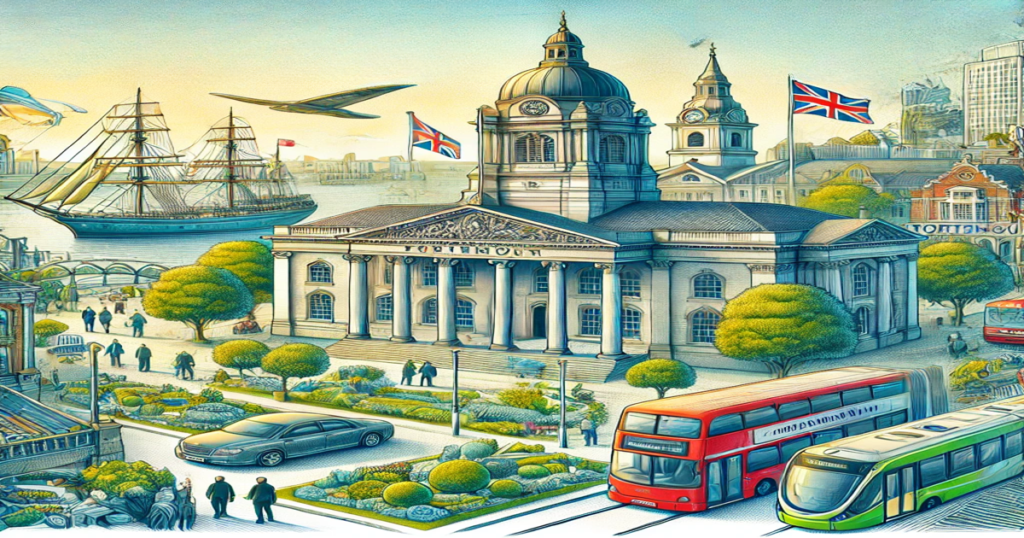Portsmouth is a fascinating city with a long history of political evolution. Today, it is administered by Portsmouth City Council, which manages all local affairs. This system effectively meets residents’ needs.
Early History and Governance
Portsmouth’s first significant step in governance came in 1194. It was granted its first market town charter, making it an essential hub for trade and governance. This charter laid the foundation for its organized administration.
By 1904, Portsmouth expanded its jurisdiction to cover all of Portsea Island. This marked a significant step in its geographical and political growth, making it a more prominent and influential town.
Expansion Onto Mainland Britain
Between 1920 and 1932, Portsmouth’s boundaries extended further. It incorporated several areas, including Paulsgrove, Wymering, Cosham, Drayton, and Farlington. This expansion increased its administrative responsibilities.
These newly added areas became an essential part of the city’s identity. They contributed to Portsmouth’s growing population and economic activity.
Achieving City Status
On April 21, 1926, Portsmouth achieved city status. This milestone reflected its growing importance as a hub of commerce and governance. The city gained recognition and new responsibilities.
City status gave Portsmouth pride and allowed the city to take on more ambitious projects to support its development.
Transition to Unitary Authority
In 1974, Portsmouth became part of Hampshire County Council. Under this larger administrative structure, it served as a second-tier authority. However, this system was short-lived.
On April 1, 1997, Portsmouth transitioned to a unitary authority. This change made it administratively independent from Hampshire County Council. It now manages all local government functions independently.
Parliamentary Representation
Portsmouth is divided into two parliamentary constituencies, Portsmouth North and Portsmouth South, which send representatives to the House of Commons. Both constituencies play an essential role in national politics.
Stephen Morgan and Amanda Martin, both members of the Labour Party, currently represent these constituencies. They advocate for the city’s interests at the national level.

Electoral Wards in Portsmouth
Each parliamentary constituency in Portsmouth contains seven electoral wards, giving the city a total of 14 electoral wards. Each ward has its unique needs and priorities.
The city’s inner center falls within the Portsmouth South constituency. This area includes many of the city’s cultural and economic landmarks.
Portsmouth City Council Structure
Portsmouth City Council oversees the city’s governance. It comprises 14 electoral wards, each electing three councilors, for a total of 42 councilors.
Each councilor serves a four-year term. This ensures continuity while allowing for fresh ideas and leadership in the council.
Current Political Leadership
Since May 2018, the Liberal Democrats have led Portsmouth City Council. They formed a minority administration and have focused on addressing local issues.
Gerald Vernon-Jackson, a member of the Liberal Democrats, currently serves as the council leader. Under his leadership, the council has tackled various challenges.
Role of the Lord Mayor
Portsmouth’s lord mayor holds a ceremonial role. The position is typically a one-year term, with the mayor representing the city at official events.
The lord mayor’s role symbolizes Portsmouth’s historical traditions and highlights the city’s commitment to civic engagement.
Civic Offices and Their Functions
The council operates from the Civic Offices located in Guildhall Square. These offices house essential departments such as tax support, housing benefits, and municipal functions.
These services ensure that residents’ needs are met efficiently. They are a vital part of the city’s governance system.
The Iconic Portsmouth Guildhall
The Portsmouth Guildhall is a cultural and political landmark. Designed by William Hill, it was built in a neo-classical style in 1873 for £140,000.
The Guildhall opened to the public in 1890 and remains a city symbol. It hosts various events and reminds visitors of Portsmouth’s rich history.
Minister for Portsmouth Role
From January 2014 to July 2016, Portsmouth had a dedicated Minister for Portsmouth. This position was created to address specific economic challenges faced by the city.
The role emerged after BAE Systems cut 900 jobs at HMNB Portsmouth. The minister was tasked with driving economic growth and attracting investments.
Addressing Economic Challenges
The Minister for Portsmouth worked to create job opportunities. Their efforts focused on rebuilding the city’s economy and supporting affected workers.
While the role was short-lived, it highlighted the government’s commitment to Portsmouth’s prosperity. It set a precedent for targeted economic interventions.
Political Landscape in Portsmouth
Portsmouth’s political scene is vibrant and diverse. The city is primarily influenced by the Labour Party and the Liberal Democrats, which compete for control.
These parties shape the city’s policies and governance strategies. They focus on improving residents’ quality of life and fostering economic growth.
Key Issues in Local Governance
Housing remains a significant challenge for Portsmouth’s leaders. The city faces a shortage of affordable housing, which the council is working to address.
Transportation is another critical issue. Improving public transport and reducing congestion are top priorities for the council.
Environmental Sustainability Efforts
Portsmouth’s leadership is committed to sustainability. The council has implemented initiatives to reduce carbon emissions and promote green energy.
These efforts align with the city’s goal of becoming more environmentally friendly and reflect residents’ growing concern for the planet.
Balancing History and Modernity
Portsmouth’s rich maritime history is a source of pride. The city council works to preserve historical sites while encouraging modern development.
This balance ensures that Portsmouth remains a dynamic and attractive place to live and visit. It also boosts tourism and local businesses.
Economic Opportunities for the Future
Portsmouth’s strategic location offers numerous opportunities. Its port and maritime industries are key drivers of the local economy.
The city council is focused on attracting investments. These efforts aim to create jobs and support long-term economic growth.
Supporting Local Communities
Portsmouth’s governance emphasizes community well-being. The council provides services that support families, education, and healthcare.
These initiatives ensure that all residents have access to essential resources. They also promote social inclusion and equality.
Conclusion
Portsmouth’s political history and governance reflect its resilience and adaptability. The city has grown from a market town to a modern urban center with a vibrant political landscape.
Today, Portsmouth continues to balance its rich heritage with progressive development. Its leaders work tirelessly to address challenges and seize new opportunities for the future.
Read More: History of Portsmouth
